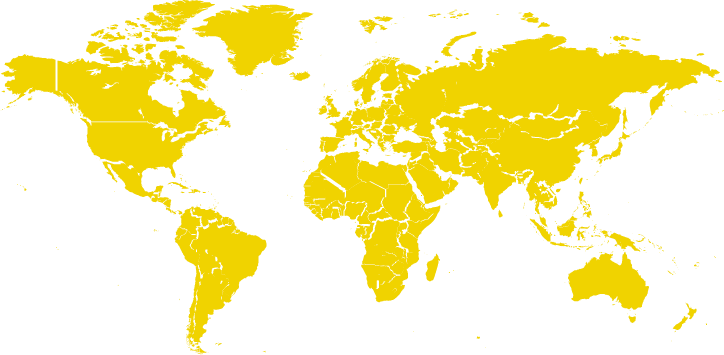The Environmental Satellite of the URI President's Council is pleased to issue this synopsis of the accomplishments of the 2011 Seed Grant awards.
We do so with special tribute to those individuals in the URI community in San Francisco, California, whose contribution of funds to promote URI's involvement in environmental issues made the Seed Grant program possible.
In alphabetical order, the Seed Grant recipients were:
1. URI Great Lakes Region Office, Uganda, which coordinated the work of four Cooperation Circles: Friends of Community Health, Latter Day Glory of Religions in Busoga, Youth Interfaith Mission, and Interfaith Youth Partnership.
Project: “Improving our livelihoods through energy efficiency and a forestation project”
Grant Category: Earth Actions Support Grant
Grant Amount: $2000
The Seed Grant was used to support the convening of two community meetings as well as the dissemination and planting of trees as follows:
A. On April 28, 2011, the URI Great Lakes Region organized a gathering in the Mayuge District to educate the community about the importance of the environment and the need to conserve natural resources. Two hundred people attended, including children from four primary and secondary schools, local council members, and members of the four Cooperation Circles. Speakers included Aram Thomas, the Mayuge district Environmental Officer; Lubanga Musa, a Natural Resource Officer; Despina Namwembe, URI Coordinator for the Great Lakes Region; and Mukisa David, coordinator for Friends of Community Health CC.
Five hundred trees were planted that day and another 500 were given to people to plant in their homesteads. In addition, the National Forest Authority and BIDCO announced that it would donate an additional 10,000 trees that September.
Mr. Thomas set the stage by describing how the Mayuge district had once been the food basket for the region, but much of its farmland was lost due to neglect. Or, in the nearby Magamaga area, farmers had switched to planting their land with sugarcane, which they then sell to nearby refineries. But this leaves the farmers with insufficient land to feed their families. He announced a number of current government initiatives, including the introduction of energy-saving stoves to reduce the use of charcoal for home cooking; the withdrawal of permission for heavy equipment and sand blasting machinery in stone quarries to operate near homes; and advocating for use of correct agronomy practices such as contour ploughing, terracing, mulching, and agro forestry.
Mr. Musa reported that in a single day, 100 sacks of charcoal are produced in the Mayuge District (one tree produces approximately four sacks of charcoal), and 750 trees are cut down each month. This results in over 540 acres being cut down in a single year. Tree cutting leads to dry flooding, which causes soil erosion and low food production in the district, as well as the loss of an invaluable source of natural medicines. Organizations such as the Civil Society Association, the Environmental Protection Group, and Eco System Management are creating programs to sensitize people to the need to preserve the environment. Tree planting is promoted yearly in public places such as schools, churches, and institutions.
Resolutions/Way Forward. It was agreed that energy-saving ways of living will be taught throughout villages. Sugarcane can be planted on less than10 acres from swamp lands to restore vegetation. URI Great Lakes agreed to plant and give out the additional 10,000 trees that would be made available in September. In addition, that URI would create its own model garden planted on land it has purchased.
B. On May 22, 2011, URI Great Lakes Region together with the Latter Glory of Saints Cooperation Circle in Busoga organized an environmental awareness campaign in the Bufuula Village of the Jinja District in Uganda. URI chose Bufuula village because the soil has been so heavily eroded there.
Approximately 100 elders and 35 children attended. A total of 215 pine and fruit trees were planted, some of them on the church premises, and everyone who attended received two trees to plant at home. The event was attended by religious and faith leaders and local council representatives. The main purpose was to educate the community about the need to preserve the environment.
Speakers included Tibenkana Ivan, Chairman of the Budondo County local council; Hannington Wako, Youth Officer for the Great Lakes Region, plus Edith, Paul, and Sylvia, three fellow members of the team; and Balumu Paul, Administrative Officer for the Great Lakes Region.URI participants included Reverend Higengyi Yeku, Sheikh Suleiman, Bishop Lubogo, and other URI staff from Kampala.
Mr. Ivan thanked URI Great Lakes for embarking on development programs in the area and said he was trying to secure additional resources for more planting of trees. He specifically pointed out the importance of leaving traditional backcloth trees in their pristine condition, because of their importance to the local ecology. Backcloth trees have many uses; one of them is to improve soil fertility, and another for shading banana trees.
Mr. Wako spoke about the wide range of products that trees provide such as timber, fruits, medicines, beverages, and oils; and he explained how critical trees are to the survival of life on this planet. They extract carbon dioxide from the air, provide oxygen, prevent erosion, and contribute to the recycling of nutrients and the retention of water. Damaging practices and uncontrolled population growth have, however, resulted in disappearing forests, and thus there is an urgent need to replant trees before it is too late. The Youth Officer cautioned people not to cut down trees, or if it was necessary, to plant five trees for every one that is cut down. Another option is to use alternative sources of power, such as solar cookers. He spoke about the way in which open fires used for cooking cause respiratory diseases, cancer, blindness, and negative health effects. He concluded by saying that URI will continue to work with Bufula community to ensure that the environment is preserved.
Mr. Paul encouraged people to look at their holy texts, or writings from leaders they admired, and to promote an ethic of reciprocity. It is important to emphasize living according to the golden rule, as it teaches us to treat the earth with the same reverence that we enjoy every day. It teaches us to accommodate one another with respect and love.
The evening concluded with the planting of a variety of orange, guava, mango, and jack fruit trees around the church and, as noted above, each member was given two trees to take home and plant.
2. Green Prophet Cooperation Circle, Tel Aviv, Israel
Project: “The Blogger’s Guide to Saving the Planet”
Grant Category: Earth Actions Support Grant
Grant Amount: $2000
The Seed Grant supported the Green Prophet CC in producing Barefoot Bloggers: Writing to Save the Planet, an online guide for people in the Middle East who want to make a contribution toward the environment. The guide is available for purchase as a digital download at http://www.greenprophet.com/barefoot-bloggers/.
The Green Prophet is itself an environmental blog. As noted in the introduction to Barefoot Bloggers, which is written by Green Prophet editor and chief contributor Karin Kloosterman:
Words connect people across our global village in powerful ways. When applied to solving environmental problems, they can translate cultural values, tell stories of hope, kick start business ventures, and mobilize green foot soldiers for change. If you are passionate about the environment and want to accelerate the exchange of information and the impact of change, this guide is for you. In it we will talk about writing for green tech, activism, and non-profits.
Think of this guide as your green writing coach. Your best friend. A shoulder to lean on. It might even help you quit your day job so you can work barefooted, like I do.
Because each writer has a world of tips and experience to offer, I have collected some of the world’s best green bloggers to share their expertise and experience in 16 chapters. Think of it as a 16 step process which will teach you the range of blogging styles, from business writing to writing for non-profits.
We will also cover ways to make money, spell out a blueprint on how to transfer from blogging to newspaper writing; there are tips on how to write for search engine optimization, how to approach celebrities for interviews, and how to find ideas when you are really stuck. This guide is your private coach and it will turn you into a champion writer for the environment.
Through this guide, we will go on a journey––one through various aspects of communication, using the self-hosted blog platform as the perfect tool for self publishing environmental stories.
Let’s go.
And, quoting from the Green Prophet website for Barefoot Bloggers: “Instead of stumbling around online looking for resources and expert opinions, start with Barefoot Bloggers. I’ve collected articles from some of the world’s most influential green bloggers––from business to non-profits and activism. You will get 16 chapters of practical and focused advice to help put your blog writing on track.”

Barefoot Bloggers Table of Contents:
1. The Basics to Barefoot Blogging
2. Standards, Sources, and Fact Collecting
3. 10 Ways to Make Green Money
4. Dangers, Traps, and Pitfalls
5. Mainstream blogger: Chris Tackett, TreeHugger
6. Non-profit Writing: Jennifer Hattam, on starting the Sierra Club blog
7. Green Muslim Writing: Arwa Aburawa
8. Jewish Green Writing: Miriam Kresh
9. Christian Green Writing: James Murray White
10. Beyond the Big 3: Tafline Laylin
11. Green Tech Writing: Michael Kanellos, Greentech Media
12. Writing for Search Engines
13. Journalism Cross-over: Joseph Mayton, Bikya Masr
14. Long-term Maintenance and Promotion
15. 99 Tips for Natural, Green Blogging
16. 18 Books for the Green Book Shelf
3. Kuna Women Artisans (Muku) CC, Veracruz District, Panama
Project: “Training for the Creation of Family Orchards and Adaptation to Climate Change”
Grant Category: Earth Actions Support Grant
Grant Amount: $500
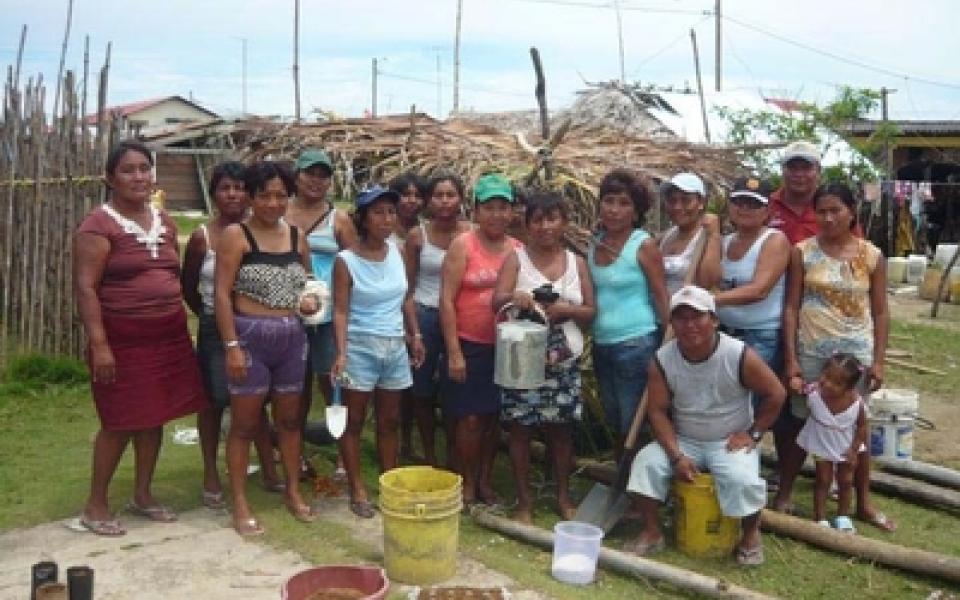
The Seed Grant supported a workshop titled "Global Challenges, Local Solutions: Creating a Family Garden,” which was organized by the Kuna Women Artisans Cooperation Circle (Muku) and the Indigenous Environmental Association (AIA). It was held in Koskuna, Panama, on May 28, 2011.
More than 32 women attended, including female community leaders, artisans, and women activists. The speakers included Geodisio Castillo, a forest engineer; Professor Marco Ortega; Marcial Arias, a community leader; Carolina Reyes Acosto, Professor of Biology, and Fany Avila a URI Global Trustee.
The workshop began with breakfast and a spiritual ceremony and invocation. Ms. Avila then spoke about the impact of climate change upon the country’s poorest communities and, in particular, the food crisis that has resulted. She invited people to really look at what lies ahead for the country and to address the very real dangers they face. She noted that through its work with URI, Kuna Women Artisans is connected to international organizations and people who are deeply concerned about the changes to the planet. One of the principles of URI is to take care like of all life on this earth, and to work with one another to conserve resources.
Ms. Avila described indigenous people as caretakers of the land; it provides them with sustenance and is a fundamental part of their existence. We have a responsibility to ensure that the future for our grandchildren is one filled with joy, good health, and a long life.
Mr. Arias stressed that climate change is also changing our traditional farming and planting. The family garden is important to save the family budget because food prices are rising at the supermarket. We also want to develop solidarity and exchange.
Ms. Reyes called attention to the wide variety in nutritional content of food. In order to receive the most nutritional value from food, it is good to grow your own garden and cultivate orchards.
Mr. Castillo talked about designing a garden plot and planting it. When selecting food to grow, it is important to vary the crops. There is a good fertilizer plant is called aviot or leaf lizard. In harsh soil a container should be used or planting in tires and soil and manure should be brought in. To sow a garden in the city requires mutual assistance and the exchange of information (for example, how close to plant fruit trees to each other). He gave detailed instructions on how to compost food, and in this way, it is not necessary to use chemical fertilizers.
Prof. Ortega spoke about the way the earth is being overheated. The UN gave evidence that women bear the brunt of the impact of climate change and natural disasters, more so than men. We need to prepare ourselves for disasters by having the appropriate supplies in stock. He also spoke about the need to cultivate medicinal plants and trees, as they can be useful in emergency situations. Furthermore, to avoid flooding it is important that we recycle all kinds of garbage and not put it in sewers. Currently oil is used for cars and for energy, and there are plans to use biofuels or food for biodiesel. Thus we are approaching famine.

The artisans expressed concerns about the rising costs of materials and therefore the need to increase their prices. Various local people spoke about the difficulty they are having with both growing and selling some foods.
Participants expressed their desire to have future workshops and plant gardens in each of their houses, so that everyone can see how the theory is put into practice. Many of them said that their grandparents taught them the traditional methods of growing food. They agreed, however, that while this wisdom is invaluable, knowledge of new methods is also very useful.
4. Pakistan Council for Social Welfare and Human Rights CC, Sialkot, Punjab, Pakistan
Project: “Environmental Education to Save the Earth”
Grant Category: Earth Actions Support Grant
Grant Amount: $1500
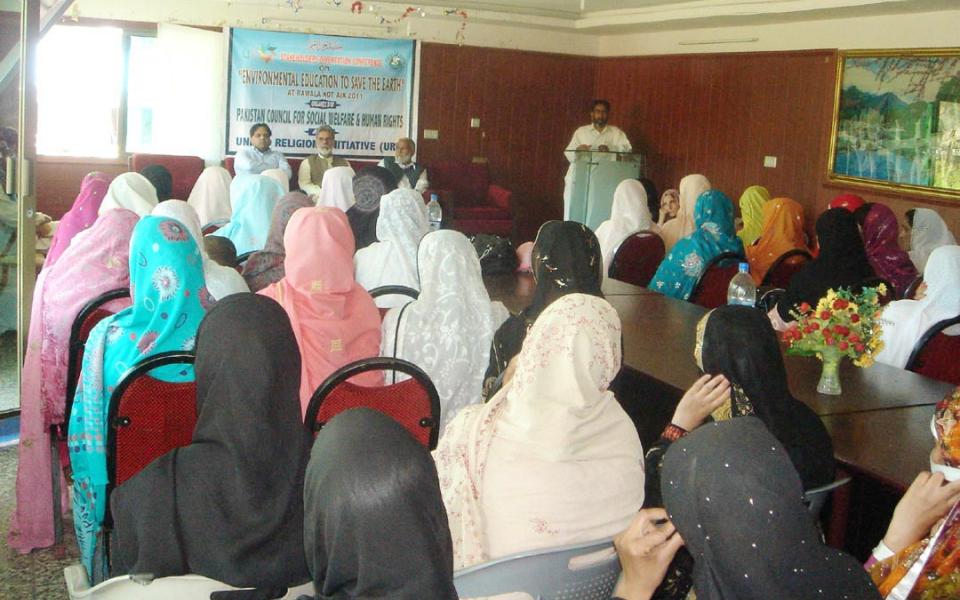
The Pakistan Council for Social Welfare & Human Rights Cooperation Circle used its Seed Grant to carry out a project through a number of activities, as follows:
When Mr. Sardar Naeem Sheraz, the Secretary from the Forest and Environment Department in the Poonch District, Pakistan, heard about the environmental training that the Pakistan Council for Social Welfare & Human Rights (PCSW&HR) would be carrying out, he offered the services of his Department. The Department provided video and audio equipment to support the training sessions in fifteen vocational centers in the Poonch District. In addition, Mr. Sardar Muhammad Rafique, the Department’s Assistant Director of Trainings attended the session to ensure a high quality of training. And, the Department donated 100,000 seedlings to be distributed at the end of the project.
Thus, PCSW&HR worked with the government to launch a public information campaign to bring awareness to hazardous pollutants that are being used in the area, and the need to protect the environment.
Participants in the overall project included Muhammad Ijaz Noori, Pakistan Council for Social Welfare & Human Rights (PCSW&HR); Rawalakot Khawaja Pervez, Deputy Commissioner General and also Administrative Chief of District Poonch; Poonch District Forest Officers Sardar Muhammad Rafique and Khalid Mehmood; and Sardar Abdul Khalique, Advocate Regional Coordinator and leader of the Master Trainers Workshop.
On May 12, 2011, PCSW&HR, with Seed Grant funding, organized a one-day Stakeholders Orientation Conference on “Environmental Education to Save the Earth.” It was held at Rawalakot, in the Poonch District of Azad Jammu and Kashmir (AJ&K) State.
All stakeholders of this project participated, including representatives from local government, community based organizations and non-governmental organizations, line departments, etc. The purpose of the conference was to orientate the stakeholders to the project and to define the role of each of them to protect our environment to save our earth.
Mr. Noori conducted the orientation conference and briefed the participants on the project. He said that project’s main purpose is to build the capacity of 450 women who are receiving vocational training at fifteen vocational training centres established by PCSW&HR in Pakistan, as well as 300 community activists (master trainers) on environmental education. This includes all components affecting the environment such as air, land and water pollution, acid rain, climate change, the destruction of rainforests and other wild habitats, the decline and extinction of thousands of animal and plant species, and promoting forestation in the selected area of Poonch District.
Mr. Noori pointed out that the environment is our entire surrounding, including everything non-living and all living beings. There are two kinds namely the natural
environment and the built environment. The natural environment is being polluted due to the unnatural factors. And though natural causes such as volcanoes have their own role in causing pollution, it is the man-made causes that are more extensive. It is the reckless and caustic human nature that is primarily responsible for environmental pollution.
Further, Mr. Noori said that it is population growth and economic advancement that have added to pollution. We must understand that every living and non-living thing is being affected. People across the globe have been facing health problems caused by pollution of land, water and air. We can prevent this with the help of other people like us; we have to work hard to do this because we are the cause of the problem. We have to save our mother earth from all of these hazards.
The role of each stakeholder was defined at the conference. Mr. Rawalakot, speaking on behalf of the Poonch District Administration, assured his full support and cooperation to accomplish this project as per the Memorandum of Understanding signed between PCSW&HR and the government of AJ&K. Mr. Pervez also assured that the necessary coordination between district government and the PCSW&HR implementation team would take place.
Mr. Rafique and Mr. Mehmood gave a comprehensive briefing about environmental pollutants and their hazards to the environment. They also highlighted the different ways to clean our environment; and they said the Forest Department will provide training to the women and master trainers with the collaboration of the PCSW&HR implementation team. They ensured their full cooperation, technical support, and guidance in the tree plantation campaign during the month of July and after care to women, master trainers, and the general public.
The PCSW&HR implementation team, with the coordination of Forest Department will also develop information, education, and communication material for the general public regarding the multiple benefits of forests to the environment, people, and animals.
At the end of conference all participants made a collective commitment to safeguard the future of our children from hazards of climate change and environmental degradation. They offered a collective prayer for peace on earth and the eradication of terrorism and extremism. Following the conference participants carried out awareness walk to create awareness among the general public regarding the environmental issues and protection.
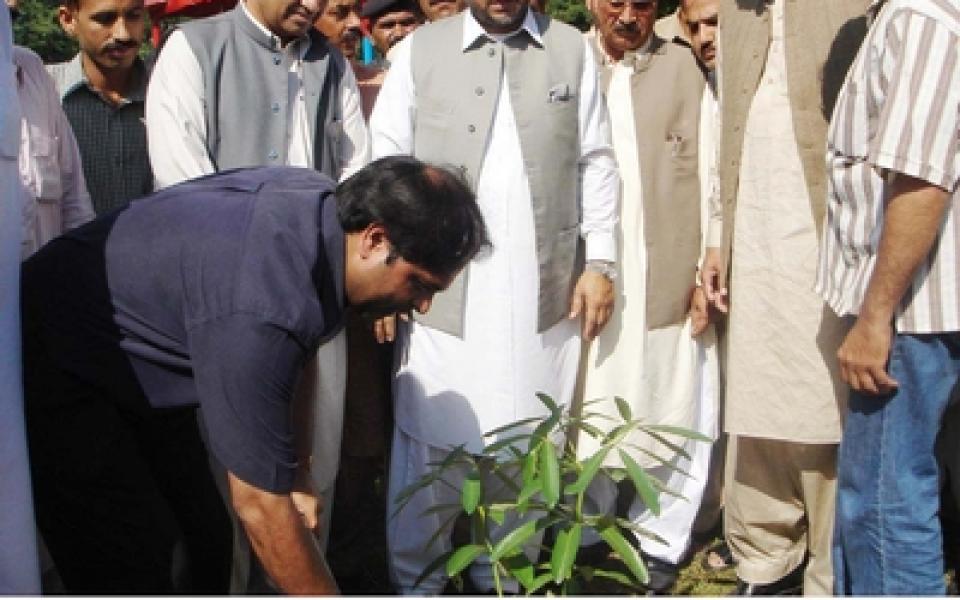
On April, 22, 2011, as World Earth Day was marked throughout the world, the Pakistan Council for Social Welfare & Human also celebrated the day as an active Cooperation Circle of the United Religions Initiatives. On the eve of World Earth Day we invited female students from different schools in Rawalakot, AJ&K, to join us in the celebration and for an environmental orientation session on air, land, and water pollution, acid rain, climate change, the destruction of rainforests and other wild habitats, and the decline and extinction of thousands of species of animals and plants.
PCSW&HR sees Earth Day as a unique learning opportunity to incorporate the importance of environmental stewardship through a specific activity or a particular lesson in their classrooms. It is also a time to teach students about the importance of civic responsibility in their schools, homes, and communities.
Students discussed how smoke-emitting vehicles, dust, pollution from the chimneys of rice and cotton-ginning mills, and cigarettes are destroying our mother earth. Also that everybody needs to treat this as a personal problem and should take little steps to protect the planet.
Students were oriented to the multiple benefits of forests and made aware of various ways to protect our environment. They took an awareness walk to make them aware of alarming pollution levels in their own local community of Rawalakot to which can be attributed diseases like shortness of breath, eye, nose and throat infections, and even cancer, which have become common. They learned that even burning tires at protests releases poisonous gases that are very harmful for the environment. And, we should use fuel-efficient vehicles and get them tuned regularly.
Also on the eve of World Earth Day 2011, as part of the Environmental Education to Save the Earth project and to further the environmental education and capacity building of the 450 women and 300 community activists (master trainers), PCSW&HR organized a “Training of Master Trainers Workshop” at Rawalakot. Some 50 Master Trainers participated in the workshop.
5. Ranchi Peace Circle, Jharkhand, India
Project: “Hariyali Tribal Movement to Save Nature”
Grant Category: Earth Actions Support Grant
Grant Amount: $2000
Yet to be completed is this year-long program of action against local mining companies that have been polluting the land and water supply in the rural area of Jharkhand, India. The project comes under the umbrella organization “Save the River” and activities include planting trees, protecting existing forests, cleaning the riverbed, and working with the local government to hold mining industries accountable for their destruction of the environment.
6. Trust Win (Women’s Interfaith Network) Cooperation Circle, MADA (Horizon) CC, Women Reborn CC
Project: “Garden of the Mothers—Opening Planting Ceremony”
Grant Category: Eco-Interfaith Action Grant
Grant Amount: $500
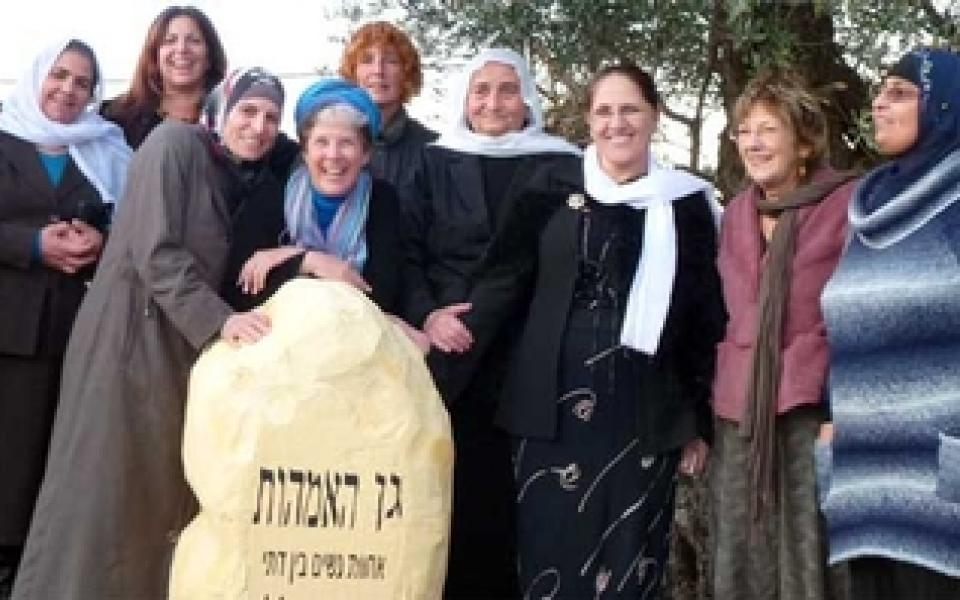
In December 2010, a devastating fire destroyed a large section of the Mount Carmel Forest in Northern Israel. The deadliest fire in Israel’s history, it claimed 44 lives from a busload of Israel Prison Service officer cadets. More than 17,000 people were evacuated, including several villages in the vicinity of the fire, and there was considerable property and environmental damage. Leaders of the Trust Win CC, MADA CC, and Women Reborn CC visited the site, offered prayers for the Christian, Druze, Jewish, and Muslim Israelis who perished, and resolved to plant trees in their memory.
The Seed Grant provided some of the necessary funds for women from the Trust Win CC, MADA CC, and Women Reborn CC to create a Garden of the Mothers as a memorial to the fire victims and to celebrate ten years of women's interfaith work in the area. In partnership with the local council of the village of Daliat HaCarmel, an area was cleared and prepared, landscaping was done including sculptures and stones, and 44 trees were planted. They then held an Opening Ceremony for the final planting of the trees on December 1, 2011, to commemorate one year since the Forest Fire. Participants included the families of the victims, women interfaith leaders, religious clergy, and school children, as well as local and regional authorities. The Garden of the Mothers now serves as a serene place for rest and inspiration in the Carmel hills, and as a welcoming site for women's interfaith gatherings. Such an event was held there on February 7, 2012, for World Interfaith Harmony Week.
7. Volunteering for Peace CC (Project Coordinator), Palestinian Peace Society CC, Palestinian Youth for Peace CC, Palestinian Women for Peace CC, United for Palestine CC
Project: “Environmental Awareness of Palestinian Youth”
Grant Category: Eco-Interfaith Action Grant
Grant Amount: $500
Volunteering for Peace Cooperation Circle in Palestine, together with its fours partners—United for Palestine Cooperation Circle, Palestinian Peace Society Cooperation Circle, Palestinian Women for Peace Cooperation Circle, and Palestinian Youth for Peace Cooperation Circle—used their Seed Grant to organize a workshop entitled “Environmental Awareness of Palestinian Youth.” The workshop was held on July 30, 2011, in Hebron, Palestine.
The workshop started with an introduction from Tareq Altamimi, URI Global Trustee and Volunteering for Peace Coordinator and also an engineer, about URI both in Palestine and the greater Middle East and North Africa (MENA) region. He spoke about the partnership among the five URI CCs in Palestine to organize this awareness-raising workshop for Palestinian youth on an important topic, namely, the ways in which the environment is suffering from climate change and other causes due to the careless behavior of the human being.
Dr. Taleb Al-Harithi, who holds a PhD degree in Environmental Studies, then spoke about the dangers facing us due to the bad human practices towards our environment. He spoke about the issue of waste and waste treatment, including the types of materials involved and the time it takes for them to decompose. Many additional issues addressed, including water use and waste water, factory wastes, waste treatment, burning of waste, dust, chemicals, etc.
Mr. Altamimi then presented the video “Greening the Desert II: Greening the Middle East.” Participants discussed the video and the similar things they find in their own city, village, or region.
Next the group divided into four working groups to develop and present possible solutions, either for individuals or groups of youth, to the environmental problems that had been presented. The working groups then presented their solutions to the group as a whole for discussion.
At the conclusion of the day, the participants decided to keep in touch through social media to continue to discuss these issues, to work on finding solutions, and to encourage a role for youth in going forward.
